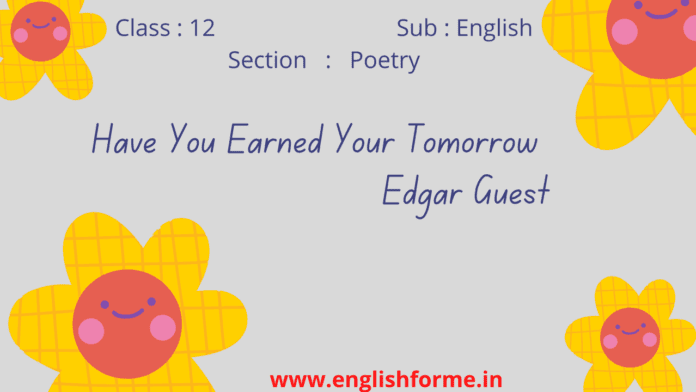Have You Earned Your Tomorrow Glossary
toiling – परिश्रम
churlish – तिरसट, उद्धट
vanish – नाहीसा होणे
throng – झुंबड
selfish – स्वार्थी
grateful – आभारी
parting – ताटातूट
slumber – झोप
Paraphrase
The poet wishes that we should make people happier. They should remember us. We should behave in such a way that they should say kind words about us. We should not be selfish. We should treat people kindly. We should communicate with them politely. We should encourage the people to come out of despair. It is with our behaviour and goodness we earn our future. We get what we give.
आपण लोकांना अधिक सुखी बनवावे अशी कवीची इच्छा आहे. त्यांनी आपली आठवण ठेवली पाहिजे. त्यांना आपल्याबद्दल दयाळूपणे बोलले पाहिजे. अशा रीतीने आपण वागले पाहिजे. आपन स्वार्थी होऊ नये. आपि लोकाशी दयाळूपणे वागले पाहिजे. त्यांच्या सोबत नम्रतेने संवाद साधला पाहिजे. लोकांना बाहेर येण्यासाठी आपि प्रोत्साहित केले पाहिजे. आपल्या वतगनासह आणि चांगुलपणामुळे आपिआपले भववष्य शमळवतो. आम्ही जे देतो ते आपल्याला मीळते.
Summary
“Have You Earned Your Tomorrow” by Edgar Guest is a motivational poem that encourages self-reflection and personal responsibility. The poem challenges the reader to consider whether they have lived their life in a way that merits a bright future. It asks if they have worked hard, been kind and compassionate, and made positive contributions to the world around them. The poem emphasizes the importance of living with integrity, honesty, and purpose, as these are the qualities that lead to a fulfilling and meaningful tomorrow. Overall, “Have You Earned Your Tomorrow” serves as a reminder to strive for excellence and to make each day count in the pursuit of a better future.
BRAINSTORMING : Have You Earned Your Tomorrow
(A1) Discuss with your friend how she/he spent the whole day that was beneficial for others.
(a) I helped the old woman to cross the road.
(b) I helped the rikshaw puller to pull the rikshaw on the ascending path.
(c) I offered water from my water bottle to a beggar.
(A2) (i) ….’was it well or sorely spent’? Explain the meaning and give illustrations.
Ans: The poet asks the readers whether they made their day well by working for others or they spent it by neglecting others.
(ii) ‘As you close your eyes in slumber do you think that God would say, You have earned one more tomorrow by the work you did today?’ Elaborate the idea expressed in these lines.
Ans : The poet advises readers that they should work for the others to their lives. If you work to improve the life human being, your life will be improved. If you are selfless, simple and kind to the world, god will offer you one more tomorrow.
(iii) The poet suggests that one should do good to others. Complete the table by giving examples of doing good to following people.
| Neighbours | Family members | Friends |
| Passing their way | Giving cheerful greeting | With kindness |
| Speaking to them | Selfless behaviour | Giving Helping hand |
(A3) (i) Pick out the describing words from the poem and add a noun of your own. One is done for you.
Toiling time
Toiling time
Careful smile
Selfish man
Mighty tower
Single sister
Fading leaves
Grateful work
Churlish behaviour
Simple task
(ii) Match the words given in column A with their meaning in column B.
| Column A | Column B |
| Cheerful | With the feeling of disappointment |
| Selfish | Lack of satisfaction |
| Sorely | Happy |
| Discontent | Concerned with one’s pleasure |
Presentation on Have You Earned Your Tomorrow
See the power point presentation of Have You Earned Your Tomorrow to understand the meaning of the poem.Activity Sheet 1
Q.3 (A) Read the given extract from Have You Earned Your Tomorrow and complete the activities given below: (10)
Is anybody happier because you passed his way?
Does anyone remember that you spoke to him today?
This day is almost over, and its toiling time is through;
Is there anyone to utter now a kindly word of you?
Did you give a cheerful greeting to the friend who came along?
Or a churlish sort of "Howdy" and then vanish in the throng?
Were you selfish pure and simple as you rushed along the way,
Or is someone mighty grateful for a deed you did today?
Can you say tonight, in parting with the day that's slipping fast,
That you helped a single brother of the many that you passed?
Is a single heart rejoicing over what you did or said;
Does a man whose hopes were fading now with courage look ahead?
Did you waste the day, or lose it, was it well or sorely spent?
Did you leave a trail of kindness or a scar of discontent?
As you close your eyes in slumber do you think that God would say,
You have earned one more tomorrow by the work you did today?
A1 Complete the following web. (02)
Ans:
A2 You have earned one more tomorrow by the work you did today? Explain the meaning of these lines. (02)
Ans : With the benevolent work we can secure our life for the coming days. If we make people happy, we will be happy tomorrow. Our present bahavior decides our future.
A3 How does your ‘good deeds’ help others to rejoice? (02)
Ans : Our good deeds help others rejoice. Our heartfelt smile and empathy bring joy in people’s lives. We should help whosoever passes by us.
A4 Identify & write the lines from the poem which express the following figure of speech and explain it. (02)
1. Alliteration
2. Interrogation
3. Synecdoche
Ans : Alliteration – ‘toiling time’ – The consonantal sound ‘t’ is repeated pleasingly.
2. Interrogation : Did you leave a trail of kindness or a scar of discontent? – Interrogative line is used with force effectively.3. Synecdoche: Is a single heart rejoicing over : The part ‘heart’ is used to indicate whole ‘person’
A5 With the help of following words compose four lines. (02)
……… Share
………. Give
………..Care
…………live
Ans : Happiness with others do you share ?
Smile and greetings do you give ?
Of public property do you take care ?
For the well being of people do you live ?
Activity 2
A1. State whether the following statements are true or false.
a. Somebody should be happier because you passed his way.
b. Someone should remember you for speaking to him.
c. There should be none to utter a kind word of you.
d. You should give cheerful greetings to the friend.
A2. “Is someone mighty grateful for a deed you did today?” Explain the meaning.
A3. Write your ideas about tomorrow’s goal.
A4. ‘toiling time’ . Name the figures of speech. Find one more example of the same.
A5. Compose a short poem by using words ‘today, tomorrow and yesterday’.
Click the “Hide/Show” button to toggle between hiding and showing the answers:
Poetic Appreciation
Write a poetic appreciation of the poem 2.4 ‘Have You Earned Your Tomorrow’ with the help of the following points.
· About the poem / poet and the title·
The theme· Poetic Style· Language /Poetic devices·
Special features·
Message, values, morals in the poem·
Your opinions about the poem
B Poetic Appreciation
Edgar Guest is known as ‘people’s poet’ for his simple style and optimistic tone of writing. The poem ‘Have You Earned Your Tomorrow’ is an inspirational poem. The poet is concerned about the readers. He asks them if they have done anything to improve the life of the other people. We are responsible for our good days and bad days. The poem is divided into four stanzas of quatrains. The first line rhymes with the second line and the third with the fourth in each stanza. He has used the consistent rhyme scheme throughout the poem. The first two lines of the first stanza are rhymed with last two lines of the second and the fourth stanzas. The poet raised questions in the poem. There are eleven questions in the poem. It shows the unique style of the poem. Alliteration and interrogation are the poetic devices in the poem. The poem has the underlying message that it is up to us whether we will have a better future or not. Therefore, we should consider our actions and deeds carefully and plan accordingly for a better future.











Nice .
Good and useful
Useful
👍👍👍
Useful
Writing skill
Summary Writing
English
Good 👍 Useful